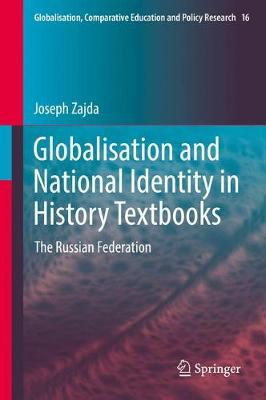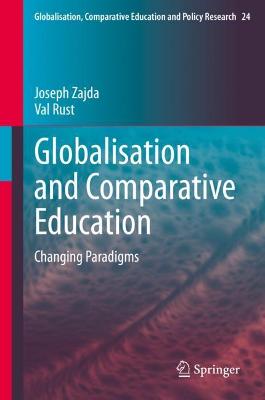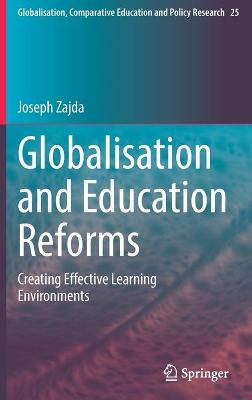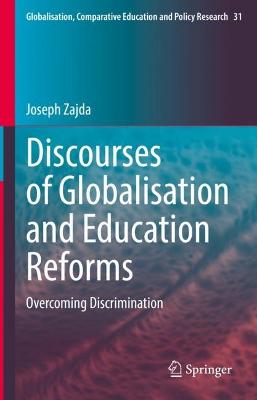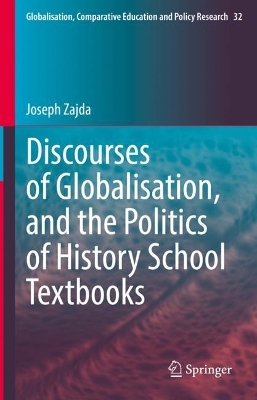Globalisation, Comparative Education and Policy Research
5 primary works
Book 16
Globalisation and National Identity in History Textbooks: The Russian Federation, the 16th book in the 24-volume book series Globalisation, Comparative Education and Policy Research, discusses trends in dominant discourses of identity politics, and nation-building in school history textbooks in the Russian Federation (RF). The book addresses one of the most profound examples of the re-writing of history following a geo-political change. Various book chapters examine debates pertaining to national identity, patriotism, and the nation-building process. The book discusses the way in which a new sense of patriotism and nationalism is documented in prescribed Russian history textbooks, and in the Russian media debate on history textbooks. It explores the ambivalent and problematic relationship between the state, globalisation and the construction of cultural identity in prescribed school history textbooks. By focusing on ideology, identity politics, and nation-building, the book examines history teachers’ responses to the content of history textbooks and how teachers depict key moments in modern Russian history. This book, an essential sourcebook of ideas for researchers, practitioners and policymakers in the fields of globalisation and history education, provides timely information on history teachers’ attitudes towards historical knowledge and historical understanding in prescribed Russian history textbooks.
Book 24
This book focuses on discourses of globalisation in comparative education research and the politics of education reforms. It analyses and evaluates the shifts in methodological approaches to globalisation and education reforms, as reflected in comparative education research and their impact on education policy and pedagogy. The book covers topics such as globalisation and comparative education, globalisation as a multidimensional construct, methods and methodologies in comparative education, the moral face of post-structuralism, and school reforms in the age of globalisation. It offers a critical analysis of education policy reforms.
The book demonstrates a complex nexus between globalisation, ideology and education reforms. On one hand, democratisation and progressive pedagogy is equated with equality, inclusion, equity, tolerance and human rights, while on the other hand, globalisation is perceived - by some critics at least - to be a totalising force that is widening the socio-economic status (SES) gap and cultural and economic capital between the rich and the poor, and bringing power, domination and control by corporate bodies and powerful political, economic and educational organisations. The perception of globalisation as dynamic and multi faceted processes clearly necessitates a multiple perspective approach in the study of comparative education globally. This book contributes in a very scholarly way, to a more holistic understanding of the nexus between globalisation, comparative education research and education reforms.
The book demonstrates a complex nexus between globalisation, ideology and education reforms. On one hand, democratisation and progressive pedagogy is equated with equality, inclusion, equity, tolerance and human rights, while on the other hand, globalisation is perceived - by some critics at least - to be a totalising force that is widening the socio-economic status (SES) gap and cultural and economic capital between the rich and the poor, and bringing power, domination and control by corporate bodies and powerful political, economic and educational organisations. The perception of globalisation as dynamic and multi faceted processes clearly necessitates a multiple perspective approach in the study of comparative education globally. This book contributes in a very scholarly way, to a more holistic understanding of the nexus between globalisation, comparative education research and education reforms.
Book 25
This book analyses discourses of effective learning environments globally. It focuses on the student's cultural identity and academic achievement, the significance of cultural and social capital to student's academic achievement, motivational strategies enhancing engagement and performance, effective teaching strategies, and quality in education for all.
The book discusses and evaluates the shifts in methodological approaches to effective learning environments and globalisation. It analyses such topics as the students' cultural identity and achievement, motivational strategies for creating effective learning environment, constructivist pedagogy for critical thinking, dimensions of discrimination in schools globally, intelligence testing and the effects on academic achievement, and values education in the classroom. The book evaluates the shifts in methodological approaches to globalisation and effective learning environments globally, and their impact on education policy and pedagogy. It contributes in a very scholarly way, to a more holistic understanding of the nexus between globalisation, comparative education research and effective learning environments education reforms.
The book discusses and evaluates the shifts in methodological approaches to effective learning environments and globalisation. It analyses such topics as the students' cultural identity and achievement, motivational strategies for creating effective learning environment, constructivist pedagogy for critical thinking, dimensions of discrimination in schools globally, intelligence testing and the effects on academic achievement, and values education in the classroom. The book evaluates the shifts in methodological approaches to globalisation and effective learning environments globally, and their impact on education policy and pedagogy. It contributes in a very scholarly way, to a more holistic understanding of the nexus between globalisation, comparative education research and effective learning environments education reforms.
Book 31
This book focuses on discourses of effective learning environments globally for reducing discrimination in schools. It offers innovative ideas concerning the future directions that education and policy reforms could take, in order to promote equality, social justice, and access to quality of education for all.
The chapters offer a timely analysis of current issues affecting schooling and strategies for creating effective learning environments globally for overcoming discriminations in schools. It is argued that that one of the most significant variables in creating effective learning environments for reducing classroom discrimination is the student’s cultural identity, the self-concept and self-esteem. The next variables influencing students’ learning environment are motivational strategies, self-regulated learning, and students’ active engagement in constructivist learning.
This book contributes in a very scholarly way, to a more holistic understanding of the nexus between globalisation, comparative education research and education reforms for reducing discrimination. It will be beneficial for a broad spectrum of users, including policy-makers, academics, graduate students, education policy researchers, administrators, and practitioners.
The chapters offer a timely analysis of current issues affecting schooling and strategies for creating effective learning environments globally for overcoming discriminations in schools. It is argued that that one of the most significant variables in creating effective learning environments for reducing classroom discrimination is the student’s cultural identity, the self-concept and self-esteem. The next variables influencing students’ learning environment are motivational strategies, self-regulated learning, and students’ active engagement in constructivist learning.
This book contributes in a very scholarly way, to a more holistic understanding of the nexus between globalisation, comparative education research and education reforms for reducing discrimination. It will be beneficial for a broad spectrum of users, including policy-makers, academics, graduate students, education policy researchers, administrators, and practitioners.
Book 32
Discourses of Globalisation, and the Politics of History School Textbooks
by Joseph Zajda
Published 4 August 2022
This book focuses on discourses of the politics of history education and history textbooks. It offers a new insight into understanding of the nexus between ideology, the state, and nation-building, as depicted in history education and school textbooks. It especially focuses on the interpretation of social and political change, significant events, looking for possible biases and omissions, leadership and the contribution of key individuals, and continuities.
The book discusses various aspects of historical narratives, and some selected key events in defining identity and nation-building. It considers the role of historiography in dominant historical narratives. It analyses history education, in both local and global settings, and its significance in promoting values education and intercultural and global understanding. It is argued that historical narratives add pedagogies, grounded in constructivist, metacognitive and transformational paradigms, have the power to engage the learner in significant and meaningful learning experiences, informed by multiple discourses of our historical narratives and those of other nations.
The book discusses various aspects of historical narratives, and some selected key events in defining identity and nation-building. It considers the role of historiography in dominant historical narratives. It analyses history education, in both local and global settings, and its significance in promoting values education and intercultural and global understanding. It is argued that historical narratives add pedagogies, grounded in constructivist, metacognitive and transformational paradigms, have the power to engage the learner in significant and meaningful learning experiences, informed by multiple discourses of our historical narratives and those of other nations.
